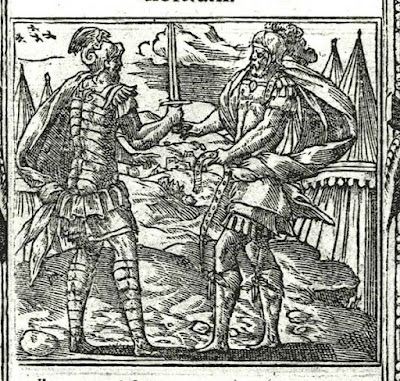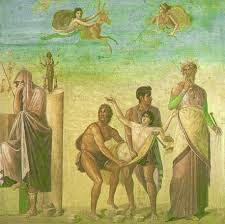Dear Mythology Students,
I hope you had a wonderful weekend! You guys only have THREE days until the break...MAKE THEM STRONG!
1. Students were offered the following "pocket question." Students were asked to use a 3x5 card for their response.
"Homer uses an "unconventional writing method" for The Odyssey." Assume your audience has no schema regarding The Odyssey, what does "unconventional methods" refer to, and why do you suppose Homer creates the epic in such a fashion?
2. Students continued with the storyboard regarding The Odyssey. Please communicate with someone in class, if you missed today's lesson. Students also watched two movie clips in order to guide them with visual understanding regarding some of the monsters that Odysseus faces in the poem.
You can watch the movie clips on your own.
https://www.youtube.com/watch?v=7nAriJGJpeY
https://www.youtube.com/watch?v=0R--FtzSx2o
sirens in oh brother where art thou (youtube)
HOMEWORK:
1. Creative Project!!! Due Date is January 4th
2. Start preparing for Final Exam, scheduled for January10th
3. Please have your HW coupon with you on THursday!
4. Mythology textbooks are due on Jan. 6th, 2017
PLEASE NOTE THE REVIEW FOR YOUR EXAM; IT IS INCLUDED FOR YOU BELOW!
Mythology Exam...January 10th, 2017
You will see approximately 25 different pieces of artwork. Each drawing, painting, sketch, statue, etc. pertains to the areas of mythology we have discussed this semester. I will ask you specific questions about each overhead. For example, you may be asked to “identify the myth illustrated” or “identify the god,” or “explain what is taking place in the image, “ etc. The most important question that you will be asked is the following: What is the true meaning behind this myth? Explain your response. The best way to completely prepare for your exam, is to go through each question below, as some aspect will appear on the test. In addition, you will be given vocabulary words given in context. If you complete the review below then 10 points will be added to your final exam score.
You may use ONE SIDE of a 3x5 card to assist you with some aspects that you might find difficult to recall. This is not required, but it's a nice form of “insurance.” You are not penalized if you don't make the card, but if you need it, and you made it, then you can use it.
One of my goals as your teacher is for you to apply what we have learned in class to the “real world.” So, if you are watching a film, listening to music spending time in a museum, reading a book, etc, and you see/hear references to mythology, you can identify them without hesitation. All of your exams will be application in nature.
Identify the Roman name, symbol(s) and domain(s) for the following Greek gods:
1. Aphrodite 5. Poseidon 9. Zeus 13. Apollo
2 Demeter 6. Hestia 10. Hephaestus 14. Hades
3. Artemis 7. Hermes 11. Athena
4.Ares 8. Dionysus 12. Hera 13. Dionysus 14. Persephone
NOTE: You need to have strong familiarity regarding the parents of each Olympian, and specifics concerning their births. In addition, you must be aware of relationships that the gods have with each other, and the result(s) of these associations. (Example: Poseidon is disrespectful towards Athena because her gift was chosen over his. Consequently, Medusa as we know her is created. (This, of course, is the abbreviated version).
Please respond using complete sentences:
15. Who are the Furies? Describe their roll, “birth,” and appearance.
16. Identify the significance of Greek drama to Mythology
17. Identify the characters associated with The Iliad, and their importance to plot progression.
. Plotline for the following myths and their associated "truths."
“Pandora’s Box”
. “Arachne”
. “Prometheus”
. “Demeter and Persephone”
. “Daphne”
. “Echo and Narcissus”
“Oedipus”
. “Antigone”
"Orpheus and Eurydice"
The Odyssey.
The Iliad
Creation Myth
EXTRA-CREDIT due on January 6th, 2017
You may earn up to 20 points of XC...each film is worth 10 points of XC. For each film, please identify what is correct and incorrect about the director's mythological portrayal. Not all of the films are on Netflix, but they are available at the Orem Public Library.
I hope you had a wonderful weekend! You guys only have THREE days until the break...MAKE THEM STRONG!
1. Students were offered the following "pocket question." Students were asked to use a 3x5 card for their response.
"Homer uses an "unconventional writing method" for The Odyssey." Assume your audience has no schema regarding The Odyssey, what does "unconventional methods" refer to, and why do you suppose Homer creates the epic in such a fashion?
2. Students continued with the storyboard regarding The Odyssey. Please communicate with someone in class, if you missed today's lesson. Students also watched two movie clips in order to guide them with visual understanding regarding some of the monsters that Odysseus faces in the poem.
You can watch the movie clips on your own.
https://www.youtube.com/watch?v=7nAriJGJpeY
https://www.youtube.com/watch?v=0R--FtzSx2o
sirens in oh brother where art thou (youtube)
HOMEWORK:
1. Creative Project!!! Due Date is January 4th
2. Start preparing for Final Exam, scheduled for January10th
3. Please have your HW coupon with you on THursday!
4. Mythology textbooks are due on Jan. 6th, 2017
PLEASE NOTE THE REVIEW FOR YOUR EXAM; IT IS INCLUDED FOR YOU BELOW!
Mythology Exam...January 10th, 2017
You will see approximately 25 different pieces of artwork. Each drawing, painting, sketch, statue, etc. pertains to the areas of mythology we have discussed this semester. I will ask you specific questions about each overhead. For example, you may be asked to “identify the myth illustrated” or “identify the god,” or “explain what is taking place in the image, “ etc. The most important question that you will be asked is the following: What is the true meaning behind this myth? Explain your response. The best way to completely prepare for your exam, is to go through each question below, as some aspect will appear on the test. In addition, you will be given vocabulary words given in context. If you complete the review below then 10 points will be added to your final exam score.
You may use ONE SIDE of a 3x5 card to assist you with some aspects that you might find difficult to recall. This is not required, but it's a nice form of “insurance.” You are not penalized if you don't make the card, but if you need it, and you made it, then you can use it.
One of my goals as your teacher is for you to apply what we have learned in class to the “real world.” So, if you are watching a film, listening to music spending time in a museum, reading a book, etc, and you see/hear references to mythology, you can identify them without hesitation. All of your exams will be application in nature.
Identify the Roman name, symbol(s) and domain(s) for the following Greek gods:
1. Aphrodite 5. Poseidon 9. Zeus 13. Apollo
2 Demeter 6. Hestia 10. Hephaestus 14. Hades
3. Artemis 7. Hermes 11. Athena
4.Ares 8. Dionysus 12. Hera 13. Dionysus 14. Persephone
NOTE: You need to have strong familiarity regarding the parents of each Olympian, and specifics concerning their births. In addition, you must be aware of relationships that the gods have with each other, and the result(s) of these associations. (Example: Poseidon is disrespectful towards Athena because her gift was chosen over his. Consequently, Medusa as we know her is created. (This, of course, is the abbreviated version).
Please respond using complete sentences:
15. Who are the Furies? Describe their roll, “birth,” and appearance.
16. Identify the significance of Greek drama to Mythology
17. Identify the characters associated with The Iliad, and their importance to plot progression.
. Plotline for the following myths and their associated "truths."
“Pandora’s Box”
. “Arachne”
. “Prometheus”
. “Demeter and Persephone”
. “Daphne”
. “Echo and Narcissus”
“Oedipus”
. “Antigone”
"Orpheus and Eurydice"
The Odyssey.
The Iliad
Creation Myth
EXTRA-CREDIT due on January 6th, 2017
You may earn up to 20 points of XC...each film is worth 10 points of XC. For each film, please identify what is correct and incorrect about the director's mythological portrayal. Not all of the films are on Netflix, but they are available at the Orem Public Library.
- Helen of Troy
- Troy
- Oh, Brother Where art Thou?
- The Odyssey
- Wrath of the Titans (This film pertains to the "Perseus" myth; I highly recommend you read the myth in your text BEFORE watching the movie).
- Sinbad (cartoon)
- Iphigenia
- What dreams by come (this film pertains to Hades)










































































